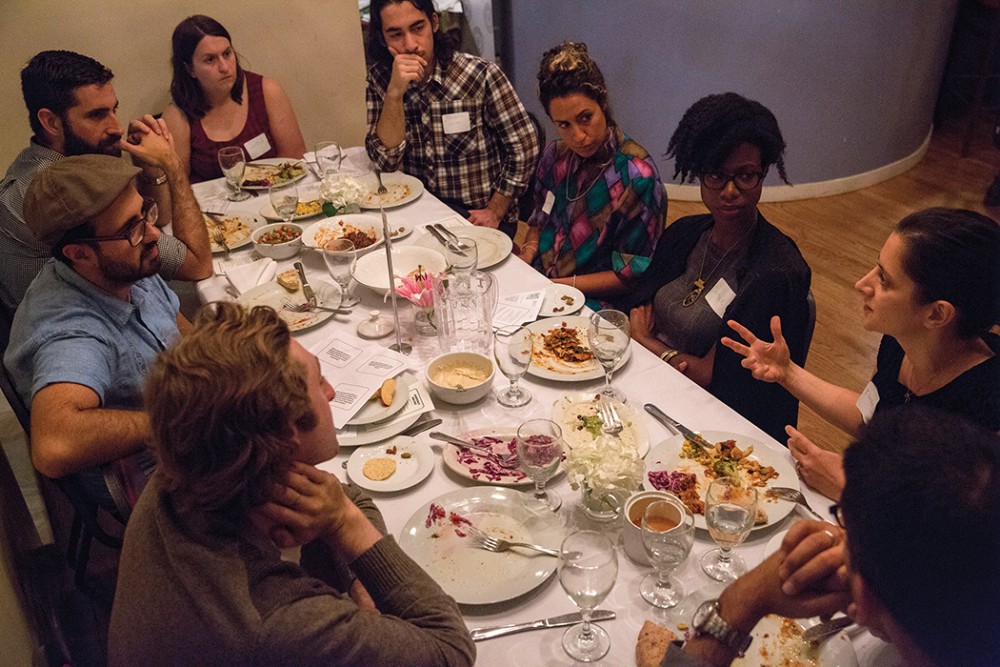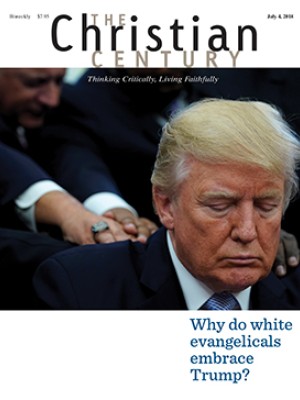At The People’s Supper, strangers explore common ground
The idea is disarmingly simple: all you need is a dinner table.

Shortly after the 2016 presidential election, African Methodist Episcopal minister Jennifer Bailey decided that people who had been bruised by the election needed a place where they could be “real people.” As she told her friend Lennon Flowers, people needed a place where they could be more than “talking points or data or voting records.”
Bailey and Flowers had met through a network of young ministers, religious leaders, and community organizers. Just out of college, Flowers had founded an organization called the Dinner Party to help young people who had experienced a significant loss connect with others who had a similar experience. Bailey had founded the Faith Matters Network to support young clergy, especially clergy of color, working in community development.
Read our latest issue or browse back issues.
The two women talked about how people needed a place where the conversation could move beyond political differences—and a place to heal from the wounds and grief inflicted by the election. Out of that conversation, Flowers and Bailey came up with the idea of holding small gatherings around a dinner table. They consulted with a colleague, Emily May, who had founded an organization called Hollaback! to work on issues of harassment. Bringing together their different kinds of expertise, they launched the project #100days100dinners and put together a conversation guide using ideas from Parker Palmer’s Center for Courage and Renewal and from Flowers’s experience with the Dinner Party. They publicized the idea on social media, encouraging people to consider hosting either a “healing supper” or a “bridging supper.”
Enough people responded to the idea in the first hundred days that the pair, along with others from their network, founded the People’s Supper. Since January 2017, the People’s Supper has sponsored more than 1,000 gatherings nationwide.
The impulse that gave rise to the People’s Supper has shaped a range of similar efforts across the country. An organization called Living Room Conversations connects diverse people using Skype and Internet chat. A group called Hi From the Other Side, the brain child of two graduate students in Boston, arranges telephone conversations between people on opposite sides of the political divide and provides guidelines for the occasion. The Listen First Project leads retreats in the woods of Maryland with the goal of modeling civility and building bonds between people who might eventually be in positions of power. An organization called Know Your Neighbor in California especially encourages Muslims to share the stories of their communities.
The method of the People’s Supper is disarmingly simple. Anyone can host, and all that is needed is a dinner table. The organization provides a guide and some basic principles for conversation. Typical discussion starters for an initial bridging supper are “How and when did you first learn about being a citizen?” “Talk about a time when you felt excluded, threatened, or unwelcome.” “Talk about a time when you felt welcome and safe.”
For a healing supper, the prompts might be “Talk about a spiritual practice that is giving you strength at this time.” “What stories from your tradition inspire you to be your most courageous self?” The People’s Supper has also developed a model called “The Big Ol’ Supper,” much larger than a dinner party, that attempts to bring an entire community together for conversation.
I attended a bridging supper last year, a potluck dinner for 14 people who gathered in Cambridge, Massachusetts, at the office of a nonprofit agency that has been engaged in bridge building for years. Participants registered ahead of time and were assigned seats in a conference room that had been turned into a dining room. A screen with a crackling fire added virtual ambiance to an otherwise sterile room. Coming from different ethnic and religious backgrounds, holding various political beliefs, we were all experiencing the risk that comes with sitting down with strangers.
The inherent riskiness of the venture is what inspired Micky ScottBey Jones, a participant in the People’s Supper and an associate fellow for the Racial Justice Institute at Evangelicals for Social Action, to name the People’s Supper a “brave space.” Jones wrote an invocation that is read at many suppers and is included in the group’s official guide. It includes these words: “Together we will create brave space / Because there is no such thing as a “safe space” / We exist in the real world / We all carry scars and we have all caused wounds.”
It turned out that at my table there was only one self-identified Republican, and he was married to a Democrat and accustomed to handling political disagreements. He was also not a supporter of Donald Trump, which perhaps made the conversation easier. I noticed, however, that participants seemed to tone down their political views. Organizers had asked us to do as much listening as talking. When someone launched into political grandstanding, they were drawn back into the conversation by the nature of the questions or by the facilitator who encouraged people to “speak from their own experience.”
In this setting, people told stories that they had likely not shared with strangers before, stories about painful divisions in their churches, or about their upbringings and what they had learned of politics from their parents.
The event offered a rare opportunity to speak with strangers, to ask people questions and to listen carefully. For that reason, it was precious time. But it was also short-lived. When the evening was over, and we said good night, we went our own separate ways with little more than new questions about ourselves and other people.
Studies and anecdotal comments indicate that such events tend to be risker for Republicans and conservatives than for Democrats and liberals. The organization Better Angels seeks to bring “Reds” and “Blues” together in a more intensely moderated setting. Family therapist Bill Doherty, who leads these efforts, says that the Reds tend to feel shamed by the Blues to a much greater degree than the Blues realize, and are often reluctant to enter into a conversation with Blues for fear of further shaming. Often the reason Reds attend such events is because they offer a chance to “de-monsterize” themselves.
Jennifer Bailey has noticed the same limits to the conversation. “If we are really going to engage people across ideological lines, it is really only through personal invitation that we can get those folks to the table. . . . And once they are there, we have to make sure the table is wide enough and open enough to hold their stories as well.” Creating a safe space is not as easy as it may sound.
One of the early responders to “#100days100dinners” was Angela Thurston, who is affiliated with Harvard Divinity School. She had a friend who is a vocal Trump supporter, and she thought she might organize a “bridging supper” by bringing him to the table. But one of the other people she wanted to invite was not ready to meet a victorious Trump supporter. What this person needed, Thurston concluded, was connections and friendships to support her. So Thurston changed direction and hosted a “healing supper,” inviting people she thought could help her friend both grieve and connect to others.
Though the idea of bridging differences has gotten a lot of attention, the vast majority of the People’s Suppers have been healing suppers. But the categories sometimes blur. Heather Abbott, another early organizer, described a supper with old friends that she thought would be in the healing category. In the midst of their conversation, racial divides that had not been evident before came to the surface. It was a painful moment, but important. The People’s Supper will only succeed, organizers say, if honest differences are shared.
Linda Lester is a retired school principal in Columbia, Tennessee, who took to heart the call to create a brave space. She had seen on Twitter that a “Big Ol’ Supper” would be happening in Nashville. She already had the idea that people in her own small town needed more intentional spaces to gather, and she had read Parker Palmer’s Healing the Heart of Democracy and wanted to act on its principles.
After the Big Ol’ Supper, she invited a few women to her home—all Christians, but with a wide variety of political views. She wasn’t sure if the event was for healing or bridging. What surprised her was how quickly the women reached an unexpected depth of conversation. Unlike many People’s Suppers, the group has continued to meet. They continue to ask each other questions and to engage in projects together. Despite their political differences, the group had agreed that they could pray collectively for local, state, and national leaders; unity; kindness; and a place to serve. They created “prayer pockets,” about the size of a luggage tag, and wrote their common prayers on them. Their goal is to distribute prayer pockets in every state, and they have done so in 16 states so far.
This form of community, across political divides, is a tentative one, and Lester knows that it might not last. Much depends on people’s schedules and a willingness to build an unusual community. Most people, typically absorbed with family, work, and church, have little room for the new and different.
The People’s Supper embodies a form of hospitality, and for Bailey the demand for hospitality is biblical. “I am feeling challenged in this season to revisit the first two chapters of Genesis: the creation story and the imaging of divine light that God says exists within all of us. . . . That means that I need to find the God presence in people that I strongly disagree with.” Her call is to see God in every person, including her political opponents, among them the white supremacist marchers at Charlottesville and the police charged with shooting unarmed black men.
“All of my work is something like the People’s Supper,” she says. “If I am going to bear my cross and preach in my actions what it means to embody the radical love ethic of Christ, then I see myself preparing tables for people that I love, because they are wounded.”
A version of this article appears in the print edition under the title “Around a table.”







